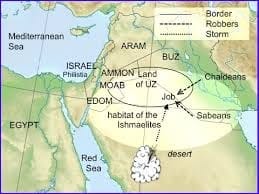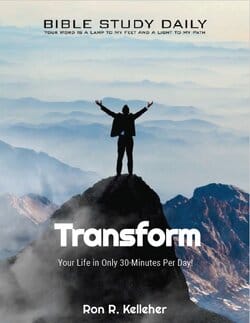What I Noticed Today (Job 1-5)
Note: Confession time. Job is one of those books in the Bible that I have struggled to understand. As many times as I have read it, some of what happens and what is said just baffles me!
Note: Job 1& 2 are prose that quickly sets up the story of Job and the tests he undergoes. Job 3, through the first half of Job 42, is Hebrew poetry. The last half of Job 42 returns to prose.
Job 1
Job’s first test.
In verses 1-3, Job lived in a land called Uz.
- Job is described as a man of perfect integrity who feared God and avoided evil. He had a large family with ten children; seven sons and three daughters. Based on the count of animals in his flocks, Job was extremely wealthy.
Note: Uz was on the northern Arabian Peninsula, probably in what we know as Edom.
In verses 4-5, Job’s sons would take turns having banquets for each other, and when a banquet concluded, Job would perform the priestly duty of purifying them and offering sacrifices for them, just in case any of them had sinned.
In verses 6-22, one day, the sons of God (angels), including Satan, appeared before God after roaming the earth.
- God spoke highly of Job, but Satan suggested that Job only loved God because God had protected and blessed him. And that if God’s hand of protection were withdrawn, Job would surely curse God.
- God authorized Satan to strike Job as long as he did not lay a hand on Job himself.
- With that, Satan struck Job four times, taking all his animals and servants, and finally, by killing all of Job’s children (Job 1:13-19).
- Despite these horrific tragedies, Job worshiped the Lord and did not sin by blaming God for anything.
Job 2
Job’s second test.
In verses 1-6, the sons of God (angels) and Satan appeared before God a second time.
- God affirmed Job’s righteousness, even in the face of having lost all his property and his children.
- Satan countered, saying Job would surely curse God if his health were taken away.
- God authorized Satan to strike Job, but he must not kill him.
In verses 7-10, Satan struck Job with sores (probably boils) all over his body.
- Job sat in an ash heap using a piece of pottery to scrape his sores.
Note: Ash heaps were typically at the city dump.
- Job’s wife asked why Job held onto his integrity and suggested that he curse God and die.
- Job rejected his wife’s suggestion saying she was speaking as a ‘foolish woman.'
Note: The Hebrew word she used is actually the word ‘bless’ as in ‘bless God and die,' but this was a Hebrew euphemism for her to avoid cursing God herself.
In verses 11-13, Job had three friends who learned about what happened to him.
- Job’s friends Eliphaz, Bildad, and Zophar, traveled to see Job to comfort him.
Note: Eliphaz came from Teman, which was a large city in Edom. Bildad was probably from the tribe of Shuah, descended from Abraham. Zophar was thought to be from northern Arabia. Eliphaz was probably the oldest of the three because he is listed first and spoke first in each of the rounds of speeches.
- When they approached Job, they tore their clothes and threw dust into their hair (a sign of mourning).
- They sat with him for seven days without saying a word because they saw Job’s suffering was great.
Note: Seven days was the usual time of mourning for a dead person.
Job 3
Job’s death wish in his opening speech.
Note: It was customary to let the grieving person speak first.
There are three sections to Job’s first speech.
- Job wishes he hadn’t been born (Job 3:1-10).
- Job wishes he had died in childbirth (Job 3:11-19).
- Job wishes he could die now (Job 3:20-26).
Job asks six ‘why’ questions (Job 3:11-23).
- Why did I not die at birth (v. 11)?
- Why did the knees receive me (v. 12a)?
- Why the breasts that I should nurse (v. 12b)?
- Why was I not still-born (v. 16)?
- Why is light given to him who is in misery (v. 20)?
- Why is light given to a man whose way is hidden (v. 23)?
Job 4
Eliphaz, the Timanite, answered Job’s opening speech. Eliphaz was a rationalist, reasoning with Job.
Eliphaz’s speech has three main sections:
- Job 4:1-6 is the opening. Eliphaz rebukes Job saying his piety should give him confidence.
- Job 4:7-11 Eliphaz condemns Job for his sufferings, saying the innocent never perish and the upright are not destroyed, but only those who plow evil and sow trouble.
- Job 4:12-21 Eliphaz claims to have a special revelation from God. A figure appeared to him asking three questions: 1) Can a person be more righteous than God? 2) Can a man be purer than his maker? 3) Are there tent cords not pulled up (they die).
Note: The point of the three questions is a man is not equal to God and should strive to attain Godly wisdom.
Some thoughts for additional consideration:
- I admire Job’s ability to maintain his integrity and faith in God’s goodness despite the massive trials that he experiences. Job knew he was right with God. He had no idea about Satan’s attempt to create a situation where he would slander God.
- The many trials in my life are so minor in comparison to what Job endured!
Note: Eliphaz’s first speech that started in Job 4 continues through Job 5.
Job 5
Note: Eliphaz claimed to have received a special word from God (Job 4:12-5:27) that helped him understand how to live a righteous life. In this speech, he suggests that his experience is true of everyone, including Job. His basic claim is that if we seek God and submit to him (5:8), and accept His correction (5:17), then God will continue to bless (5:18-27).
Eliphaz’s speech in Job 5 has three main sections:
- Job 5:1-7. Eliphaz says angels (holy ones) could not intervene on Job’s behalf because they are foolish (4:18). Additionally, Eliphaz suggests Job is a fool for not realizing his afflictions come from within man.
- Job 6-16. Eliphaz says Job should appeal to God directly because God delivers the needy and the poor.
- Job 17-27. Eliphaz concludes this speech saying Job should be happy because God is disciplining him. God saves the righteous from famine, the sword, from slander, destruction, hunger, and wild beasts. The righteous man will be secure, have many descendants, and have a long healthy life.
What did you notice in your study today? Feel free to visit the website and leave a question or a comment.


